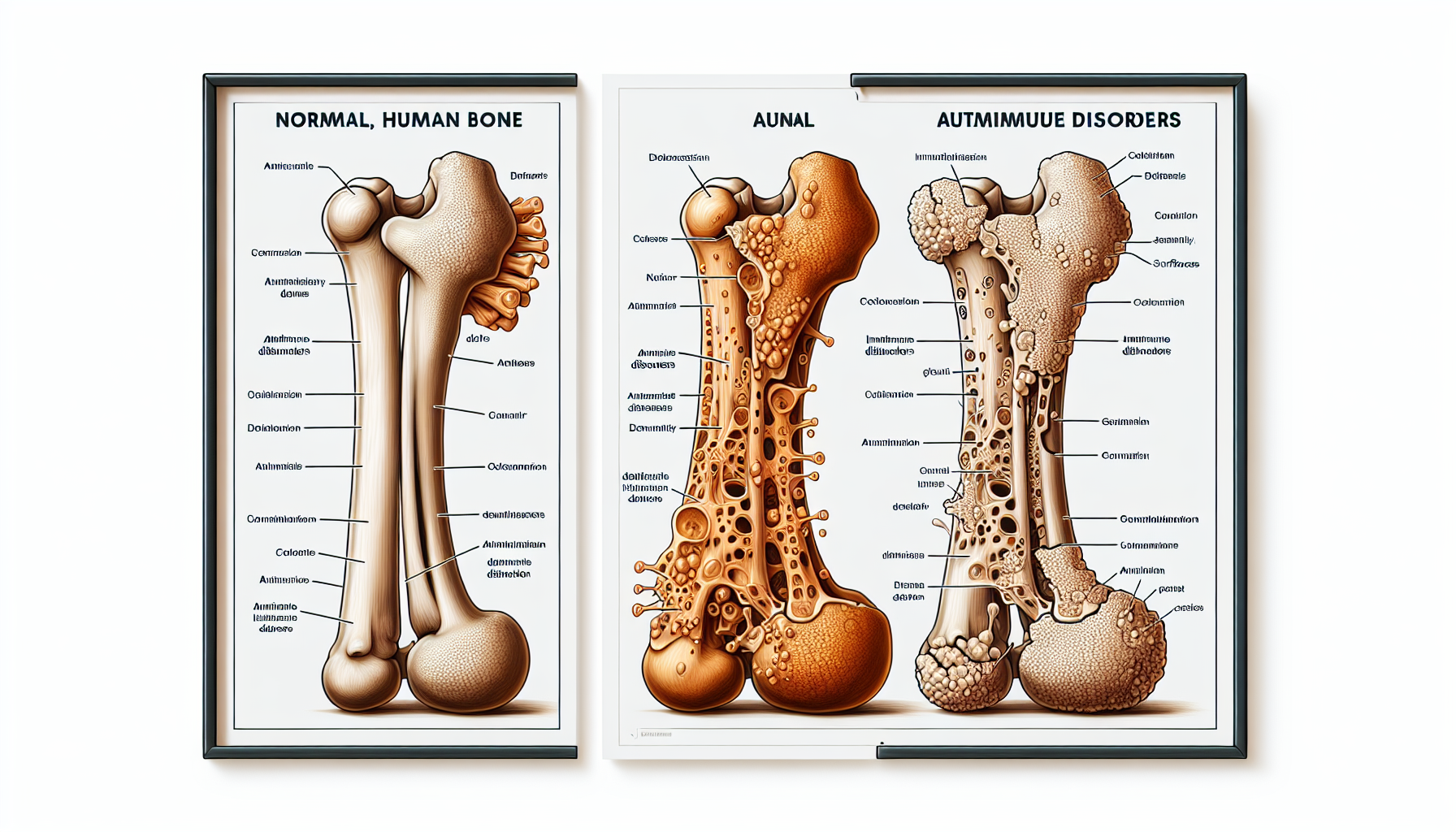Autoimmune disorders are conditions where the immune system mistakenly targets and damages the body’s own tissues. These disorders can have a significant impact on various aspects of health, including bone health. The relationship between autoimmune diseases and the bones is complex, as the inflammatory processes and treatments associated with these conditions can lead to changes in bone density and structure. Understanding this impact is crucial for individuals with autoimmune disorders to manage their bone health effectively.
Autoimmune Disorders and Bone Density
Bone health is a critical aspect of overall well-being, as our bones provide structure, protect organs, store calcium, and anchor muscles. However, for individuals with autoimmune disorders, maintaining bone health can be a challenging task. Autoimmune conditions such as rheumatoid arthritis, lupus, and multiple sclerosis are often associated with an increased risk of osteoporosis and fractures. This can be attributed to several factors, including chronic inflammation, hormonal changes, and the use of corticosteroids, which are commonly prescribed to reduce inflammation but can also lead to decreased bone density.
Chronic inflammation, a hallmark of autoimmune diseases, can stimulate osteoclasts, the cells responsible for bone resorption. This can lead to an imbalance in the bone remodeling process, where the breakdown of bone outpaces its formation. Over time, this can result in a loss of bone mass and density, making bones more susceptible to fractures.
For those interested in exploring the general aspects of bone health and ways to maintain it, Avix Health offers a comprehensive guide on the subject that can be found here.
How Autoimmune Disorders Affect Bone Remodeling
Bone remodeling is a natural process where old bone tissue is replaced by new bone tissue. This process is essential for maintaining bone strength and repairing micro-damages that occur over time. However, autoimmune disorders can disrupt this balance. The excessive immune response can increase the activity of osteoclasts, resulting in more bone being broken down than is rebuilt.
The significance of this process and its impact on overall bone health cannot be overstated. For a deeper understanding, the article on Understanding Bone Remodeling and Its Significance offers valuable insights into how this process works and why it’s crucial for individuals with autoimmune disorders to be aware of it.
The Role of Medications in Bone Health
Medications used to treat autoimmune disorders, particularly glucocorticoids, can also contribute to bone loss. While these medications are effective at controlling inflammation, they can decrease the absorption of calcium from the gut, reduce the production of bone-forming cells, and increase the lifespan of bone-resorbing cells. This dual action not only accelerates bone loss but also impairs new bone formation.
It is important to consider the balance between managing the autoimmune disorder and mitigating the side effects of medications on bone health. Strategies to enhance bone health while on these medications are discussed in the article Strategies to Enhance Bone Healing after Injury, which provides practical advice on supporting bone repair and strength.
Nutritional Considerations for Bone Health
Nutrition plays a pivotal role in maintaining bone health, especially for those with autoimmune disorders. A diet rich in calcium and vitamin D is essential for bone density, as calcium is the primary mineral found in bones and vitamin D is necessary for calcium absorption. Individuals with autoimmune conditions need to be vigilant about their nutrient intake to counteract the effects their disease and its treatment may have on their bones.
For specific dietary strategies, the article Nutritional Deficiencies and Their Effects on Bone Health delves into how certain deficiencies can impact bone health and offers guidance on addressing them.
Exercise and Bone Strength
Physical activity is another critical factor in maintaining bone health. Weight-bearing and resistance exercises can help build and maintain bone density by stimulating bone formation. For individuals with autoimmune disorders, engaging in regular, appropriate exercise can help mitigate bone loss and improve overall health.
However, it is crucial to tailor exercise routines to individual capabilities and limitations, as excessive or improper exercise can exacerbate autoimmune symptoms or lead to injury. Consulting with healthcare professionals to design an exercise plan that is both safe and effective is essential.
External Resources Supporting Bone Health in Autoimmune Disorders
Several high-quality resources provide further information on the impact of autoimmune disorders on bone health. The National Osteoporosis Foundation (nof.org) offers a wealth of information on osteoporosis, including specific considerations for those with autoimmune conditions. The Arthritis Foundation (arthritis.org) also provides resources on how arthritis, a common autoimmune disorder, affects bones and joints.
For cutting-edge research on the topic, the Journal of Autoimmunity (elsevier.com) publishes peer-reviewed articles exploring the relationship between autoimmune diseases and various health outcomes, including bone health. These resources can offer valuable insights and research findings that can help individuals better understand and manage the impact of their autoimmune disorder on their bones.
Conclusion
The impact of autoimmune disorders on bone health is multifaceted, involving the interplay of inflammation, medication side effects, nutritional deficits, and the need for tailored physical activity. Individuals with autoimmune conditions must proactively manage their bone health with the guidance of healthcare professionals to prevent osteoporosis and fractures.
By understanding the challenges and taking informed steps towards maintaining bone health, those affected by autoimmune disorders can improve their quality of life and reduce the risk of bone-related complications. It is a journey that requires diligence, care, and a comprehensive approach to health management.



